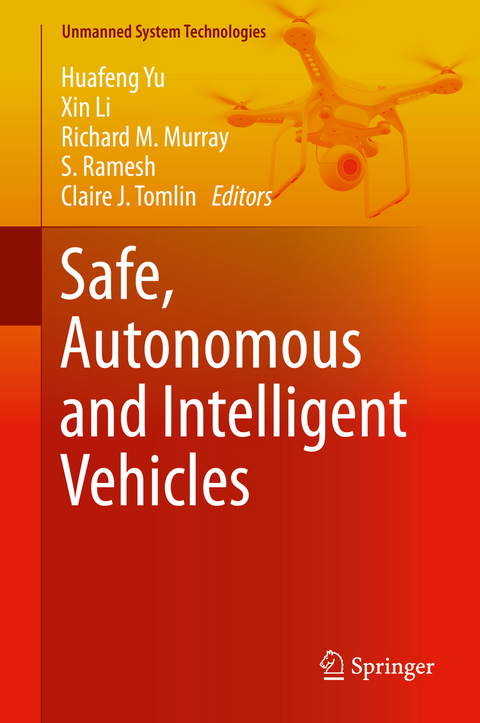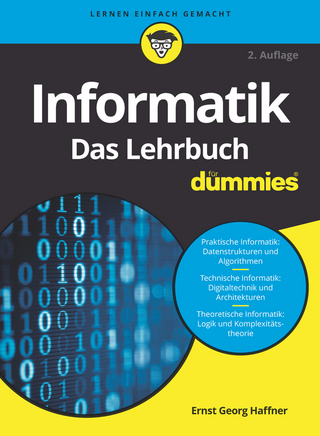
Safe, Autonomous and Intelligent Vehicles
Springer International Publishing (Verlag)
978-3-319-97300-5 (ISBN)
This book covers the start-of-the-art research and development for the emerging area of autonomous and intelligent systems. In particular, the authors emphasize design and validation methodologies to address the grand challenges related to safety. This book offers a holistic view of a broad range of technical aspects (including perception, localization and navigation, motion control, etc.) and application domains (including automobile, aerospace, etc.), presents major challenges and discusses possible solutions.
Huafeng Yu is a senior researcher with Boeing Research & Technology. He is currently working on Safety, Assurance and Certification for Unmanned Aircraft Systems and Self-Driving Vehicles, and is the technical lead for AI safety and assurance in The Boeing Company. Huafeng's main research interests include formal methods, safety assurance, artificial intelligence, machine learning, model-based engineering, and cyber security. Prior to joining Boeing, he has been working in TOYOTA, ALTRAN, INRIA, Gemplus, and Panasonic. He has experience of more than 15 years on safety research and development in the domains of automobile and aerospace. Huafeng is currently a member of IEEE Technical Committee on Cybernetics for Cyber-Physical Systems (CCPS) and chair of its industry outreach subcommittee. He has been a member of SAE standard committee for AADL. Huafeng serves as associate editor of IET Journal on Cyber-Physical Systems, guest editor of IEEE Transaction on Sustainable Computing and ACM Transactions on Cyber-Physical Systems. He has served on Program Committees of DAC, DATE, ICCAD, SAC, ICPS, DASC, SmartWorld, ARCH, SLIP, WICSA and CompArch, and AVICPS. Huafeng received his PhD from INRIA and University of Lille 1 (France, 2008) and Master from University Joseph Fourier (France, 2005), both in Computer Science. Xin Li received the Ph.D. degree in Electrical and Computer Engineering from Carnegie Mellon University, Pittsburgh, PA in 2005, and the M.S. and B.S. degrees in Electronics Engineering from Fudan University, Shanghai, China in 2001 and 1998, respectively. He is currently a Professor in the Department of Electrical and Computer Engineering at Duke University, Durham, NC, and is leading the Institute of Applied Physical Sciences and Engineering (iAPSE) at Duke Kunshan University, Kunshan, Jiangsu, China. In 2005, he co-founded Xigmix Inc. to commercialize his PhD research, and served as the Chief Technical Officer until the company was acquired by Extreme DA in 2007. From 2009 to 2012, he was the Assistant Director for FCRP Focus Research Center for Circuit & System Solutions (C2S2), a national consortium working on next-generation integrated circuit design challenges. He is now on the Board of Directors for R&D Smart Devices (Hong Kong) and X&L Holding (Hong Kong). His research interests include integrated circuit, signal processing and data analytics. Dr. Xin Li is the Deputy Editor-in-Chief of IEEE TCAD. He was an Associate Editor of IEEE TCAD, IEEE TBME, ACM TODAES, IEEE D&T and IET CPS. He served on the Executive Committee of DAC, ACM SIGDA, IEEE TCCPS, and IEEE TCVLSI. He was the General Chair of ISVLSI, iNIS and FAC, and the Technical Program Chair of CAD/Graphics. He received the NSF CAREER Award in 2012, two IEEE Donald O. Pederson Best Paper Awards in 2013 and 2016, the DAC Best Paper Award in 2010, two ICCAD Best Paper Awards in 2004 and 2011, and the ISIC Best Paper Award in 2014. He also received six Best Paper Nominations from DAC, ICCAD and CICC. He is a Fellow of IEEE.
Introduction.- Statistical Validation of In-Vehicle Machine Learning Systems.- Cyberattack-Resilient Hybrid Switching Controller Design with Application to Unmanned Aircraft System.- Control and Safety of Autonomous Vehicles with Learning-Enabled Components.- AdaStress: Adaptive Stress Testing and Interpretable Analysis of Safety-Critical Systems.- Provably-correct control synthesis for vehicle safety systems.- Reachable Set Estimation and Verification for Neural Network Models of Nonlinear Dynamic Systems.- Adaptation of Human Licensing Examinations to the Certification of Autonomous Systems.- Model-based Software Synthesis for Safety-critical Cyber-Physical Systems.- Compositional Verification for Autonomous Systems with Deep Learning Components.- Index.
| Erscheinungsdatum | 24.11.2018 |
|---|---|
| Reihe/Serie | Unmanned System Technologies |
| Zusatzinfo | XIII, 204 p. 69 illus., 60 illus. in color. |
| Verlagsort | Cham |
| Sprache | englisch |
| Maße | 155 x 235 mm |
| Gewicht | 497 g |
| Themenwelt | Mathematik / Informatik ► Informatik ► Theorie / Studium |
| Technik ► Elektrotechnik / Energietechnik | |
| Schlagworte | Autonomous Intelligent Vehicles • autonomous system design • On-Road Intelligent Vehicles • Safety in Autonomous and Intelligent Vehicles • self-driving cars and UAVs |
| ISBN-10 | 3-319-97300-2 / 3319973002 |
| ISBN-13 | 978-3-319-97300-5 / 9783319973005 |
| Zustand | Neuware |
| Haben Sie eine Frage zum Produkt? |
aus dem Bereich


